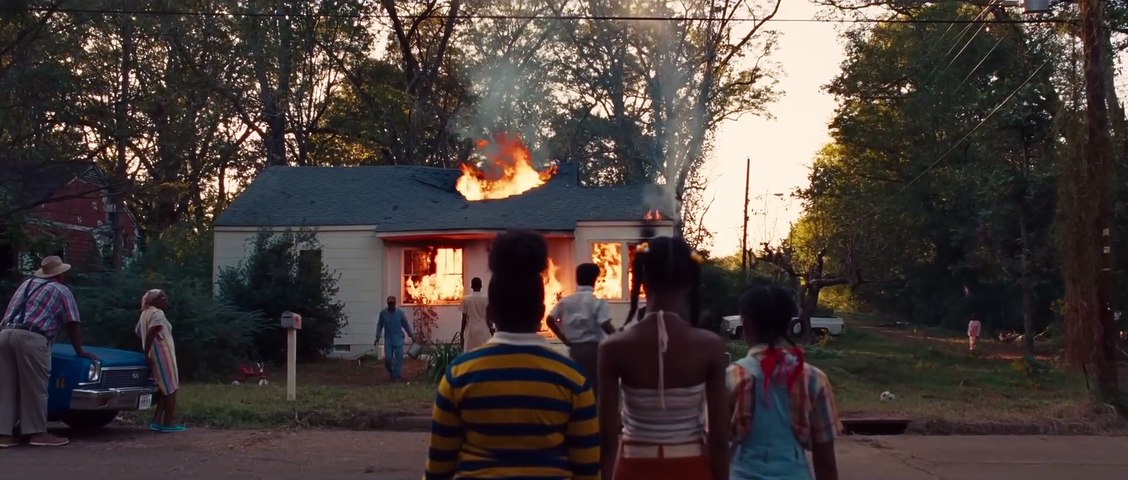This blog post is the inaugural entry in a series dedicated to the films I had the privilege of viewing at the 14th American Film Festival (AFF) in Wroclaw, held at my beloved New Horizons Cinema. This annual festival showcases the best of American independent cinema.
In this article, I delve into Raven Jackson’s debut feature, All Dirt Roads Taste of Salt. This film stands out at the AFF, diverging significantly from the typical blockbuster-driven American cinema, which often prioritizes spectacle over substance.
Raven Jackson’s Cinematic Debut: A Journey into Patience and Contemplation

Raven Jackson’s work, conversely, invites patience and contemplation, demanding a stillness of mind. It challenges us to let go of the need for a linear narrative, encouraging a deeper engagement with the film’s tactile richness that can mesmerize and captivate.
Jackson’s background as a poet and photographer is evident in every aspect of the film. The narrative unfolds not through dialogue but through meticulously crafted visuals and soundscapes. The film’s poetry emerges from its potent, almost overwhelming visual storytelling.

A Deep Dive into Mackenzie’s Life: Capturing Decades of Transformation
Set against the backdrop of Mississippi during the 1970s and 1980s, All Dirt Roads Taste of Salt weaves the poignant life story of Mackenzie, a Black woman, and the ones who influenced her life in the most profound ways: Grandma Betty (Jannie Hampton), sister Josie (portrayed by both Jayah Henry and Moses Ingram), and mother Evelyn (Sheila Atim). Spanning four decades, the film traces Mack’s journey from childhood (Mylee Shannon) to her thirties (Charleen McClure) and later adulthood (Zainab Jah), capturing the evolution of her identity as her hair transitions to grey.

Time and Memory: Blurring the Lines in a Fluid Narrative
The film’s narrative is artfully fragmented. It seamlessly transitions between different periods of Mack’s life, blurring the lines between past and future into a continuous present. In this fluid temporal landscape, time and space converge, creating a reflective mirror of the fluidity of identity itself. The film thus occupies a liminal space, intertwining the temporalities of generations of women.

Water and Touch: Symbolic Motifs Weaving through the Film
Central motifs of water and touch are elegantly woven throughout All Dirt Roads Taste of Salt. The film both opens and closes with water, symbolizing both continuity and transformation. The opening scene, where Mackenzie’s father (Chris Chalk) teaches her to fish, is an embodied metaphor for the viewer’s journey through the film – an encouragement to be patient, to fully absorb each image, allowing its depth and meaning to resonate deeply.
The film’s conclusion, with an older Mack reflecting on her love for rain, reinforces water’s role as an eternal shapeshifter. This portrayal of water adds a layer of emotional depth, enhancing the audience’s sensory connection to the film. Moreover, the film explores water as a symbol of female fluidity, encompassing blood, milk, and tears. This concept is subtly referenced in the film’s title, drawing inspiration from the practice of geophagia, or earth-eating, a tradition that symbolizes a connection to ancestors and adds a complex layer to the film’s exploration of time and identity. Furthermore, this underscores the critical significance of ancient traditions, which colonialism sought to eradicate, particularly in an era that necessitates a reimagining of our relationship with the Earth.

Another pivotal aspect of the film is its emphasis on tactility. This focus is vividly conveyed through the recurrent imagery of hands, with their interactions underscoring the film’s sensory richness. The tangible quality of these elements is further highlighted by the decision to shoot in 35mm, a choice that amplifies the film’s textural intricacies.
Cinematographic Intimacy: Invading the Viewer’s Space
The cinematography invades our personal space with unapologetically close shots, creating an intimate, almost intrusive experience. It challenges us to either embrace or resist this intrusion. By accepting the film, we immerse ourselves in its imagery, experiencing a hypnotic rhythm that evokes a trance-like state. Moreover, the film also employs wide shots, allowing characters to merge with their surroundings, blurring the distinction between humanity and nature.

Exploring Identity and Ecology: The Lyrical Layers of Jackson’s Masterpiece
All Dirt Roads Taste of Salt is a magical, lyrical masterpiece that addresses themes of race, feminism, and ecology. It challenges the linear temporality associated with capitalist progress, critiquing the relentless forward momentum demanded by a patriarchal, capitalist society that often exploits marginalized groups. Through its tactile nature and rejection of traditional temporal structures, Jackson’s film defies the Cartesian dichotomy of mind and body, celebrating an identity that is fluid and multifaceted.
All Dirt Roads Taste of Salt as a Symbol of Diverse American Identity
Raven Jackson’s film is an ode to an American identity that is rich and diverse, symbolised by the earth soaked in water, blood, and tears of African American women, offering a profound commentary on the complexities of human existence and connection.

